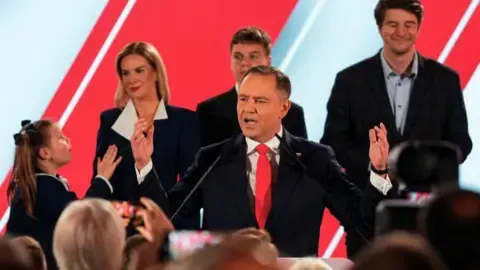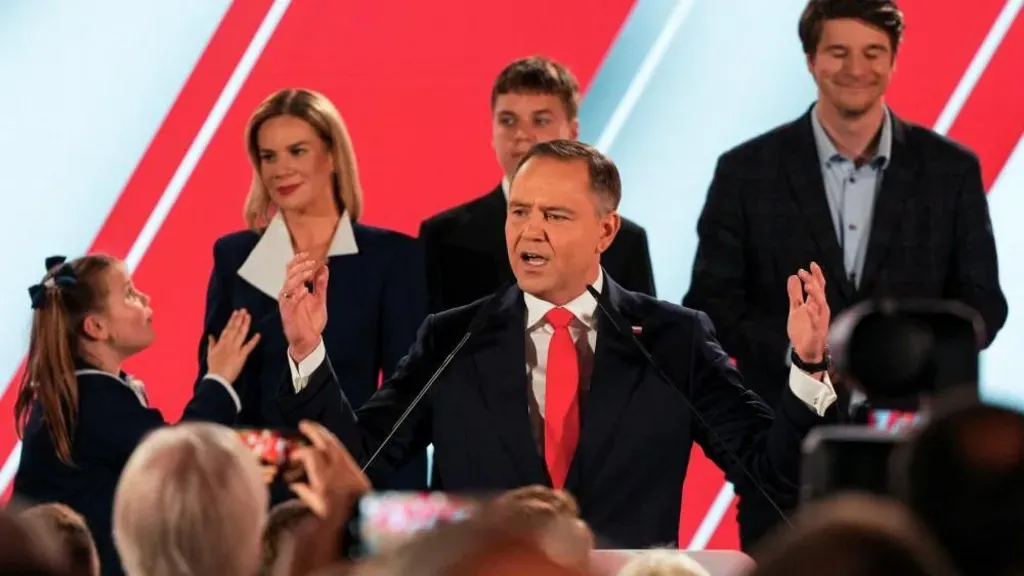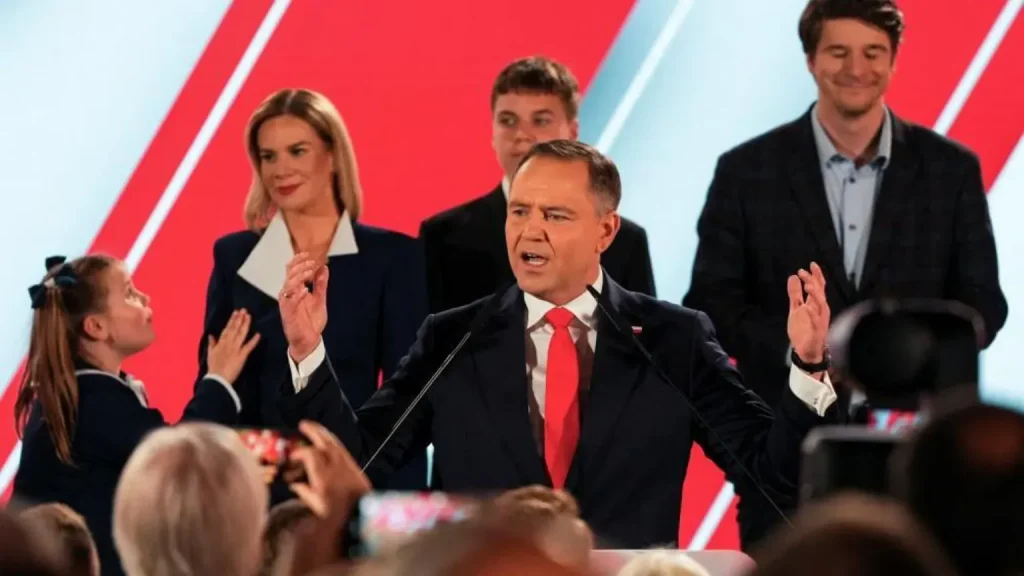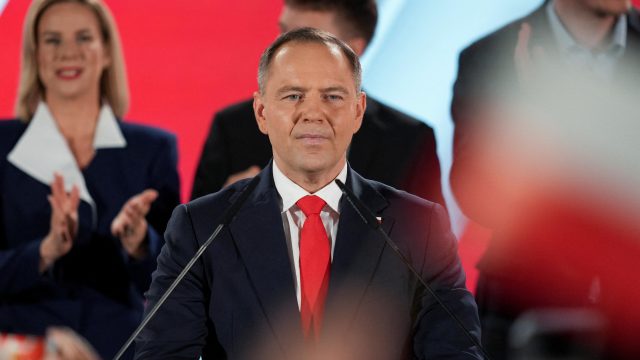Table of Contents
Karol Nawrocki In a stunning political twist that defied exit polls and early predictions, right-wing historian Karol Nawrocki has been elected the new President of Poland. The result shocked many, flipping the script on a vote that initially suggested a victory for liberal rival Rafal Trzaskowski, the Mayor of Warsaw.
Despite being a ceremonial position, the presidency holds substantial power through legislative veto, a tool Nawrocki is expected to wield against Prime Minister Donald Tusk’s pro-European agenda.

The Candidates
Karol Nawrocki – A Rising Star
At just 42, Nawrocki was a relatively unknown figure nationally until he emerged as the unofficial pick of the national conservative Law and Justice (PiS) party. Known for his love of boxing and fitness, he styled himself as a “man of the people”, committed to upholding Poland’s Catholic traditions and sovereignty.
His alignment with Donald Trump and conservative politics made him appealing to Poland’s rural and nationalist base.
Rafal Trzaskowski – The Liberal Face of Poland

A seasoned politician and ardent supporter of EU integration, Trzaskowski stood for modernization, liberal values, and stronger EU ties. His support base was largely urban, young, and pro-European. He was seen as the candidate who could help recenter Poland in European mainstream politics.
Election Day Drama
Exit Poll Shock
When voting ended at 9:00 PM local time, exit polls suggested Trzaskowski had narrowly won — 50.3% to Nawrocki’s 49.7%. The liberal camp erupted in celebration. Trzaskowski claimed victory early, declaring it a win for progressive Poland.
His wife, Malgorzata, even joked, “I’m close to having a heart attack,” reflecting the high-stakes nature of the race.
Final Result

By dawn, the tide had turned. The state electoral commission (PKW) confirmed that Karol Nawrocki had won with 50.9% of the vote, defeating Trzaskowski’s 49.1%. It was an electoral nail-biter, prompting Nawrocki to say, “We will win during the night… I believe we will wake up with President Karol Nawrocki.” And he did.
What Led to Nawrocki’s Victory?
Nationalist Messaging
Nawrocki’s consistent message of “sovereignty, faith, and family” resonated deeply, particularly in rural areas. His opposition to EU migration quotas and climate policies found fertile ground among voters wary of Brussels’ influence.
Trump Factor and PR Moves
Flying to Washington during the campaign to snag a photo-op with Donald Trump might have seemed gimmicky to some — but it played perfectly with his conservative base.
Coupled with regular gym selfies and football photos, Nawrocki sold himself as strong, grounded, and relatable.
The Apartment Controversy
Things got rocky when it was revealed that Nawrocki owned two apartments, one of which he obtained under controversial circumstances. He had said he only owned one, like “most Poles.” He was accused of exploiting an elderly pensioner.
To neutralize the backlash, Nawrocki pledged to donate the disputed property to charity. The PR damage was minimized, thanks in part to his swift response.
Reactions from Key Figures
Trzaskowski’s Concession
Clearly shaken, Trzaskowski accepted defeat but described the campaign as a “fight on a razor’s edge.” His supporters were devastated, seeing the result as a missed chance to reset Polish politics.
Duda’s Congratulations
Outgoing president Andrzej Duda, a key PiS figure, called the election “a courageous fight for Poland”. His two-term legacy now finds a successor likely to continue blocking progressive reforms.
Donald Tusk’s Statement
Tusk responded with political tact, stating he understood the “gravity of the moment.” He announced plans to call a vote of confidence in parliament — a symbolic move designed to reassert control over his fragile coalition.
What This Means for Poland
Power of Presidential Veto
Though the president can’t set laws, his veto power means Donald Tusk’s coalition will struggle to pass reforms on the judiciary, abortion rights, and more — unless they can build larger majorities.
Future of EU Relations
Tusk and Trzaskowski want Poland to play a leading EU role. Nawrocki, however, views Brussels with skepticism. Expect continued clashes over migration, climate change, and judicial reforms.
Reinvigorated PiS Opposition
Eighteen months after losing power, the PiS now has a champion in the presidency. This result will embolden them to regroup for 2027, aiming to retake the government.
The Road Ahead
Nawrocki’s Priorities
Expect focus on:
- Traditional Catholic values
- Opposition to EU overreach
- Protecting Polish identity
- Law and Order narratives
He will likely use his veto to block liberal bills and frame himself as a guardian of national values.
Challenges Facing Tusk
Tusk will have to navigate vetoes, internal dissent, and a divided electorate. His strength in parliament isn’t enough to override presidential blockades — making negotiation essential.
Conclusion
Karol Nawrocki’s razor-thin victory reflects a deep ideological divide in Poland. While the role of president is limited in power, the symbolic and legislative implications are huge. With a nationalist now occupying the presidential palace, Poland’s political tug-of-war is far from over. The next few years will test the resilience of Poland’s democracy, the unity of Tusk’s coalition, and the country’s place within the European Union.
FAQs
1. Why was Nawrocki’s victory surprising?
Because the exit polls showed Trzaskowski ahead, making Nawrocki’s final win a shock reversal.
2. What powers does the Polish president have?
Mainly ceremonial, but crucially, the power to veto legislation, which can stall a government’s agenda.
3. How did the apartment scandal affect Nawrocki?
It briefly threatened his image, but he neutralized backlash by donating the property to charity.
4. What is the impact on EU-Poland relations?
Tensions may rise as Nawrocki supports Polish sovereignty and opposes deeper EU integration.
5. Could Trzaskowski return in 2027?
Yes. He remains popular and is still the liberal camp’s strongest figure for future elections.
Please don’t forget to leave a review.







































